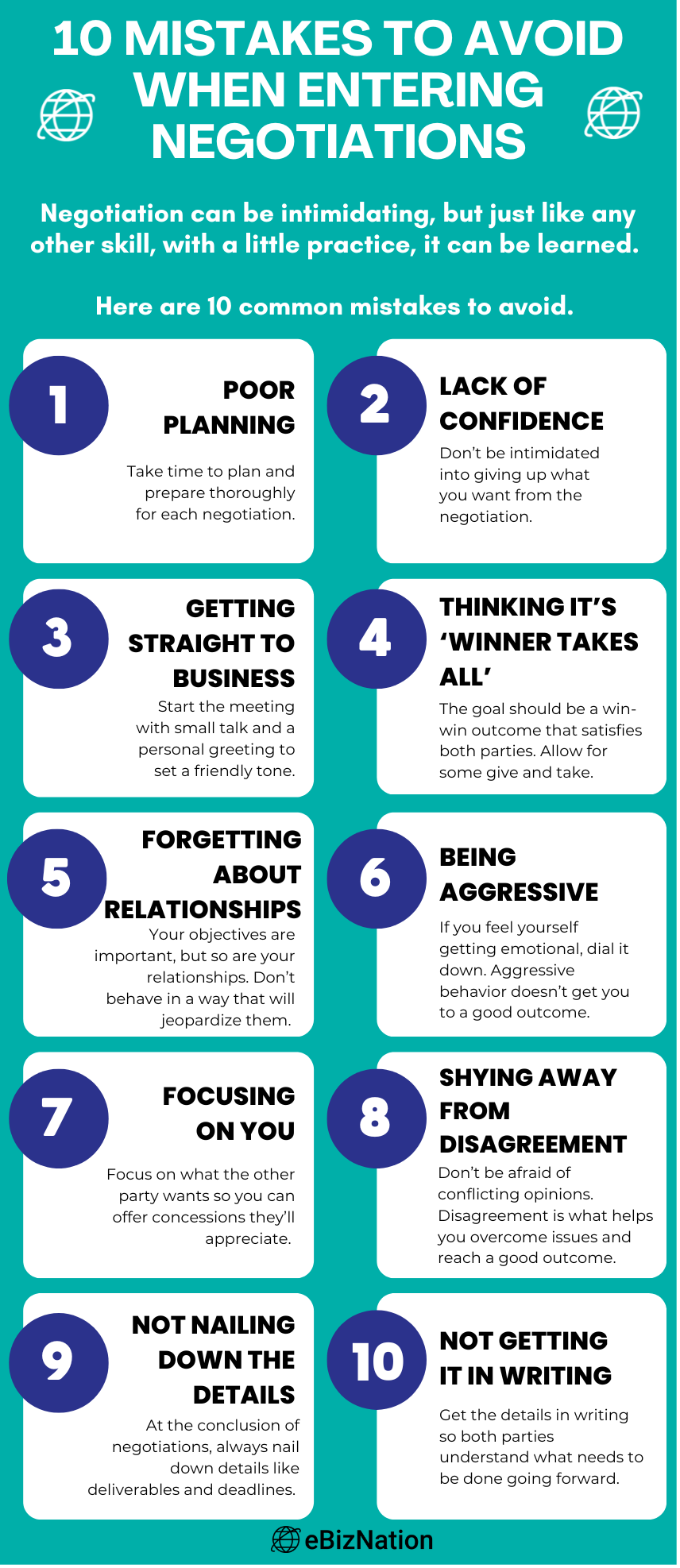10 Common Business Negotiation Mistakes to Avoid

How are your negotiating skills? You may not realize it, but negotiating is something you do every day. So developing good negotiations skills is important both in business and life. To become a great negotiator, you need to master a specific set of skills. Luckily, anyone can do it – all it takes is awareness and practice. Here are 10 Common Business Negotiation Mistakes to Avoid and 10 tips to help you improve the outcomes and value of all your business negotiations
10 Business Negotiation Mistakes to Avoid

Mistake #1 – Poor Planning
Never go into a negotiation without preparing adequately. You’ll need to prioritize your objectives, research the other party, plan concessions, and anticipate their objections and questions so you can respond to them.
Mistake #2 – Lack Confidence
Don’t be intimidated! Negotiation is a discussion where you each state clearly what you want and then try to reach as mutually beneficial outcome. It’s not a battle, but a conversation. If you feel nervous, practice some mindfulness exercises and deep breathing just prior to the meeting.
Mistake #3 – Getting Straight to Business
Don’t launch straight into negotiations. Start by building rapport so you feel a personal connection with the other person. After some small talk about common interests, lead the conversation naturally into the discussion.
Mistake #4 – Thinking It’s ‘Winner Takes All’
You’ll both walk away from the meeting with some of your objectives met and some compromises made. Going into the meeting unwilling to concede anything is not negotiating, it’s steamrolling.
Mistake #5 – Forgetting about Relationships
Make sure you keep in mind the relationship you have with the other party. Try to create an outcome that not only satisfies both parties now, but also paves the way to a stronger relationship going forward.
Mistake #6 – Being Aggressive
Don’t let things get emotionally heated. If you feel aggressive or hostile, this won’t lead to a good result. The discussion should be calm and measured.
Mistake #7 – Focusing on YOU
Your interests will be top of mind, but the negotiations shouldn’t be all about you. Don’t forget to acknowledge the needs of the other party and consider their perspective and objectives.
Mistake #8 – Shying away from Disagreement
Don’t be afraid to disagree. Disagreement is where you find issues to work on together, eventually reaching a solution. State disagreements in a soft and friendly way.
Mistake #9 – Failing to Nail Down the Details
Once you’ve reached an agreement, nail down the details. Decide what actions each party must take and what deliverables are needed, and then come up with clear deadlines.
Mistake #10 – Not Getting It in Writing
Get these agreement details in writing, even if it’s just in a follow-up email. This will help ensure both parties are on the same page.
10 Tips When Entering Negotiations
Tip #1 – Set the Scene
Create an environment that’s conducive to a successful negotiation. It should be relaxing, with few distractions. Don’t use a meeting room or other venue that might feel cold and intimidating. It should be casual so that you can foster a personal connection.
Tip #2 – Aim for a Win-Win
The goal of negotiation isn’t just to get what you want. A good negotiation results in both parties walking away happy with the results. When preparing and discussing with the other party, focus on what ideas would benefit both parties, not just one.
Tip #3 – Start with Areas of Agreement
Open the discussion by stating your areas of agreement. Give the other party a chance to correct or clarify. Once you’ve established this, you have a positive foundation on which to tackle disagreements.
Tip #4 – Prioritize Your Objectives
Before the meeting, list your objectives. Choose one or several things you want to get out of the negotiation. Prioritize these so you can focus on the most important first. You may not get everything you want, but you’ll get the ‘must-haves’ that will render the negotiation a success.
Tip #5 – Do Your Homework
How well do you know the other party? Research and get to know them. Know their objectives and try to anticipate what they will say when you discuss yours. Understanding the other party is essential for choosing concessions and alternative ideas.
Tip #6 – Prepare Concessions
Choose a few concessions – things you could give up or add to the deal that would benefit the other party. Planning these ahead of time will give you a better position from which to negotiate.
Tip #7 – Be Assertive
Be assertive. Don’t be shy about stating what you want. You’ve identified your most important objectives already, so stick to these. Discuss ideas and options, always keeping your ‘must-have’ objectives in mind.
Tip #8 – Keep an Open Mind
Although you should be assertive and stick to your most important objectives, be open-minded and ready to consider alternatives. When you discuss the points you disagree on, the other party will offer ideas. The two of you will consider various options to find something that will work
Tip #9 – Practice Active Listening
Among other things, active listening involves repeating back to the other person what they’ve said, to check for understanding and to demonstrate your attentiveness. By paraphrasing and summarizing, you can also make sure you understand their position fully.
Tip #10 – Focus on Relationship Building
Aim for a good outcome in this negotiation, but also make it a priority to build a strong relationship with the other party. This ensures that future negotiations will be successful too.
Conclusion
By avoiding these common mistakes, you can improve your negotiation skills and achieve more successful outcomes in business dealings.



